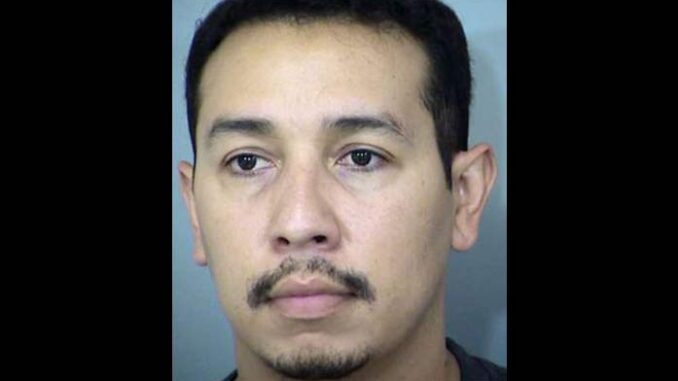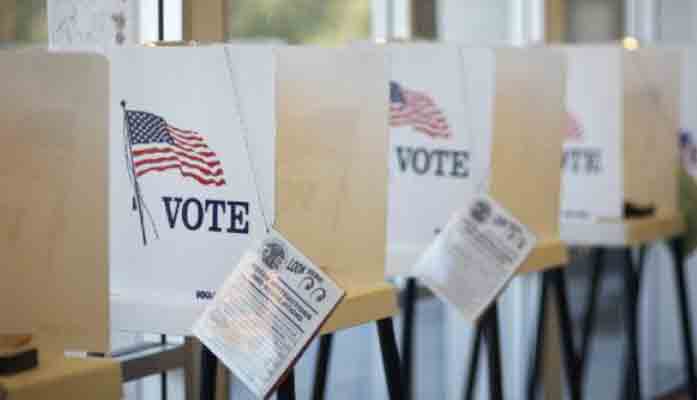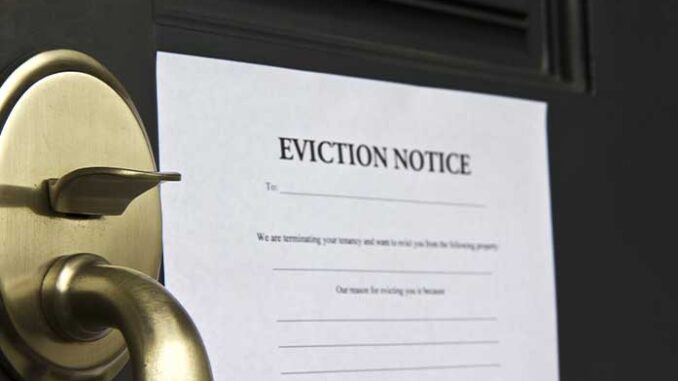
by Terri Jo Neff | Aug 7, 2021 | News
By Terri Jo Neff |
The arrest of Arizona Sen. Otoniel “Tony” Navarrete (D-LD30) on multiple charges of sexual misconduct with minors has led to demands for his resignation, and many of those making the statements are including information about hotlines for victims of abuse.
Navarrete was taken into custody Thursday on seven felonies involving sexual misconduct with two boys, ages 16 and 13. An initial court appearance was held by video feed in a Maricopa County courtroom Friday at which time a judge set Navarette’s bail at $50,000.
According to court records, the older boy reported multiple incidents of abuse to the Phoenix Police Department on Wednesday. The next day a detective recorded a confrontation call between the boy and Navarrete before making the arrest.
A confrontation call is a common practice used by detectives in sexual abuse cases, particularly with children who cannot confront a suspect in person. The victim is told by a detective what types of things to say and ask in an attempt to obtain incriminating evidence against a suspect to use at trial.
A number of pretrial release conditions were also ordered in Navarrete’s case, including a no-contact order with the two victims as well as all other minors. He must also consent to electronic monitoring if he posts bail.
If convicted of all charges, Navarrete faces a mandatory prison sentence of nearly 50 years.
After the hearing, several public officials called on Navarrete to resign.
“Sen. Navarrete should resign immediately,” Gov. Doug Ducey’s statement read. “These allegations are abhorrent. My prayers are with the young victims and their loved ones during this traumatic time”
The governor’s statement was followed by Senate President Karen Fann.

“These are serious and alarming charges that require Senator Navarrete to step down immediately,” Fann stated Friday afternoon.
Raquel Teran, a state lawmaker and chair of the Arizona Democratic Party also joined the calls for Navarrete’s resignation.
“Like many in our community, I am grieving as more details come out about the charges against my Senate seatmate,” Teran tweeted. “I am calling on Senator Otoniel ‘Tony’ Navarrete to resign immediately. We are elected to protect the most vulnerable, and that begins with our children.
Other Democrats who called for Navarrete to step down Friday are Arizona Secretary of State Katie Hobbs and Kathy Hoffman, Arizona’s Superintendent of Public Instruction.
Also garnering attention after Thursday’s arrest is a tweet Navarrete made Wednesday morning complimenting US. Senator Mark Kelly, who was critical of Brett Kavanaugh’s nomination for the U.S. Supreme Court in 2018. Kelly called Kavanaugh “a dangerous choice” for the bench.
Blake Masters, who hopes to be Kelly’s opponent in the 2022 General Election, called out the senator for his silence on Navarrete’s arrest.

Navarrete, who is a member of the Arizona Legislature’s LGBT caucus, was elected to the State House of Representatives for LD30 in 2016. Then in 2018, he was elected to the State Senate, where he was assigned to the Senate’s appropriations, commerce, and health & human services committees during the last legislative session.
His official Senate biography lists his regular job as Deputy Director for Promise Arizona, a nonprofit community-based organization located in Phoenix. As Deputy Director, Navarrete worked to promote policies which “strengthen families and increase civic participation,” the biography reads.

by Terri Jo Neff | Aug 7, 2021 | Education, News
By Terri Jo Neff |
In March, the Foundation for Rural Service (FRS) released a report on the pandemic’s impact across rural America, particularly after millions of people were forced to conduct most of their daily life, business, and education online.
“Never before has reliable access to high-speed internet been as important as it has been during the COVID-19 pandemic,” said FRS Executive Director Pam Becker. “Broadband connects us to our work, education, health care, government programs and—most importantly—one another.
In rural Arizona, the pandemic made it apparent that Internet “is quickly becoming the fourth utility and a necessity right along with gas, electricity, and water,” according to Heather Floyd, spokesperson for Valley TeleCom Group (VTC). “The pandemic only increased the speed that society moved to depending on Internet to facilitate our day to day lives.”
VTC started as a telephone cooperative serving southeast Arizona and southwest New Mexico in the 1960s. Over the years, its service area has expanded to provide phone and Internet service to more than 20 rural communities spread over thousands of square miles, many of which are in mountainous areas.
For the past five years, the company proactively installed fiber Internet technology to all the schools in its service area. When COVID-19 and its various lockdowns hit last year, the disparity between Internet service in Arizona’s rural and metropolitan areas became more glaring, particularly for kids forced into remote learning, said Floyd.
VTC officials stepped up and implemented a number of activities in response to COVID-19, including providing free Internet service for 40 homes from April to June 2020, installing 8 WiFi Hotspots throughout its territory, and offering discounted service for 37 households.
Then in May of this year, VTC got on board with the FCC’s Emergency Broadband Benefit Program (EBBP) which provided $10,000 each to 10 school district in the company’s service territory for the purchase of laptops and tablets for students doing in-home learning.
But VTC isn’t resting on its laurels, according to Floyd.
This school year, company officials continue to facilitate opportunities for students in VTC’s service communities, including providing 17 schools and 7 libraries with fiber internet, considered the best level of service. Also being continued is VTC’s involvement with the FCC’s EBBP which will provide a discount of up to $50 a month for households struggling to pay for Internet.
Schools within VTC’s service area also have a new tool -the FCC’s Emergency Connectivity Fund (ECF)- for providing in-home Internet access for students and teachers. ECF reimburses schools for equipment and internet access for those who need Internet connections placed in their homes.
And another option became available Aug. 1 for students unable to sign up for ECF, Floyd said. The option, Discounted Access for Student Homework (DASH), provides Internet service for students at only $29.95 per month. DASH, which is designed for educational use, is filtered to comply with the Children’s Internet Protection Act (CIPA), so many entertainment websites are blocked.
More information about VTC’s programs can be found at https://www.vtc.net

by Terri Jo Neff | Aug 4, 2021 | News
By Terri Jo Neff |
While the public awaits the Arizona Senate’s report on how Maricopa County conducted the 2020 General Election, one senator is demanding Arizona Attorney General Mark Brnovich investigate the actions of the county’s board of supervisors in connection to the audit.
On Tuesday, Sen. Sonny Borelli (R-LD5) formally called on the attorney general to launch an investigation of the county board’s refusal to fully comply with Senate subpoenas issued in January and July as part of the audit. State law obligates Brnovich, also a Republican, to determine within 30 days whether the county has violated state statutes.
Should a violation of state law have occurred, Maricopa County could lose its portion of Arizona’s shared sales taxes. As of June 30, the county had benefited from shared sales taxes to the tune of $700 million, according to public records.
Borelli was not the only state lawmaker upset Tuesday by Maricopa County’s official attitude toward the Senate audit.
Rep. Jake Hoffman (R-LD12) accused the board of supervisors of engaging in “one of the most divisive and dangerous subversions of government” ever witnessed in Arizona.
“The Board’s blatant disregard for the Constitution and public mockery of the lawful oversight of elections by the Arizona legislature is not only disrespectful, it undermines the very fabric of our Republic,” Hoffman added. “Through its obstructionism, lack of transparency, and outright trampling of the Constitution, the Board of Supervisors has effectively spit in the face of every voter in Maricopa County and this state.”
Hoffman’s statement was in response to ongoing comments by Jack Sellers, the Republican chair of the county board, who has been openly critical of the Senate’s audit.
On Monday, Sellers chastised the Senate for hiring auditors with “no experience and little understanding” of how elections are run. He also characterized the audit as an “adventure in never-never land.”
“If you haven’t figured out that the election in Maricopa County was free, fair, and accurate yet, I’m not sure you ever will,” Sellers wrote. “There was no fraud, there wasn’t an injection of ballots from Asia nor was there a satellite that beamed votes into our election equipment.”
Sellers also called on elected officials “to tell the truth and stop encouraging conspiracies” and he challenged the Senate to be prepared to defend any accusations of misdeeds by the county.
“It’s time to move on,” Sellers wrote at the end of his letter.
Sellers’ tone and tenor is the norm for public comments issued by county officials about the audit, including a July 16 tweet by @MaricopaCounty which called the audit contractors “unqualified and untrained.” The tweet also repeated a common county mantra about the unreliability of any data put forth by Cyber Ninjas, the company Fann hired to conduct the Senate’s audit.
In other audit-related news, Judge Michael Kemp of the Maricopa County Superior Court issued an order Tuesday mandating Fann to comply with a request submitted in May for audit-related documents.
American Oversight sued Fann and the Senate after Fann and the Senate’s attorneys denied the non-profit advocacy group access to several audit-related documents via a public record request. The Senate turned over a number of documents, but several were denied on the basis that those documents were in the possession of Cyber Ninjas and its subcontractors, thus not qualifying as public records.
Kemp turned away Fann’s efforts last month to dismiss American Oversight’s lawsuit. Then on Tuesday, the judge ruled Arizona’s public records law requires the disclosure of the remaining documents.
According to Kemp’s ruling, Cyber Ninjas and its various subcontractor are private companies -not officers or public bodies- but are “clearly agents of the Senate Defendants.” Thus the Senate has a duty “to keep and maintain all records relating to this audit,” including all records of Cyber Ninjas and its subcontractor.
“Whether these public documents are in the actual physical control or possession of Senate Defendants is irrelevant to their duties and obligations,” under Arizona’s public records law, the judge ruled. Kemp added that claims that the senators have not seen the requested Cyber Ninjas documents does not carry water.
“Willful blindness does not relieve Senate Defendants from their duties and obligations” under the public records law, he ruled.
It is expected that the Senate will file with the Arizona Court of Appeals for review of Kemp’s ruling.

by Terri Jo Neff | Aug 3, 2021 | News
By Terri Jo Neff |
Current Secretary of State Katie Hobbs and former Phoenix-area television news anchor Kari Lake are nearly even in a favorability, according to a survey released Monday by Phoenix-based OH Predictive Insights (OHPI) about the top 8 candidates for the 2022 gubernatorial race.
The six-day Arizona Public Opinion Pulse survey of Arizona registered voters started July 6 and revealed Hobbs, a Democrat, rated a combined 40 percent for very or somewhat favorable. Lake, a Republican, came in at 39 percent very or somewhat favorable.

The next closest was Kimberly Lee, Arizona’s Treasurer and a Republican, with a 32 percent very or somewhat favorable rating.
In a head-to-head rating of the 5 Republican gubernatorial candidates, Lake topped Salmon with 60 percent to 51 in the very and somewhat favorable, with Yee coming in at 39 percent. Robson garnered 37 percent and Gaynor at 34 percent.
However, all 8 announced candidate have ample opportunity to generate favorable opinions among voters, according to the survey. Hobbs had a 34 percent rating for “no opinion / never heard of” while those surveyed gave Lake a 39 percent no opinion / never heard of (NHO).
The survey also shows the other 6 candidates had ratings which broke down into three groups, starting with Republicans Kimberly Yee and Matt Salmon closely matched up at 32 percent very or somewhat favorable for Yee and 31 percent for Salmon. The no opinion / NHO ratings for the two came out at 48 percent Yee and 46 percent Salmon.
The next group, Democrats Aaron Liberman and Marco Lopez, both rated at 25 percent in the favorable categories, with Lieberman at 53 percent no opinion / NHO and Lopez at 54 percent.
The last group, both Republicans, was not all that far behind, with Karrin Taylor Robson at 23 percent favorable, edging Steve Gaynor by one percentage point. Both also rated at 57 percent no opinion / NHO.
On the flip side, AZPOP found Hobbs with the highest percent of very or somewhat unfavorable rating at 27, while all 7 other candidates were at only 20 to 22 percent.

by Terri Jo Neff | Aug 2, 2021 | News
By Terri Jo Neff |
Landlords across America are owed more than $15.3 billion in rent arrears, and that amount is expected to hit nearly $19 billion by December, according to a report released last week by the Federal Reserve Bank of Philadelphia just as a federal moratorium on residential evictions expired.
In Arizona, residential rent debt – including utility costs normally paid to a landlord or management company- is estimated at more than $292,000 million across 43,900 households, That represents 5.9 percent of all renter households in the state, just above the national average of 5.8 percent out of 6.5 million households.
The Fed Reserve statistics are based on estimated rent arrears related directly to a loss of employment revenue during the COVID-19 pandemic. It is estimated that roughly 138,500 Arizonans -and more than another 15 million people nationwide- are in arrears under that criteria alone.
The justice courts in Arizona’s 15 counties are expecting an onslaught of new evictions filings, as well as a push for removal notices from landlords who previously filed for and received an order for eviction but were prevented from enforcement due to the moratorium implemented by the Centers for Disease Control and Prevention (CDC).
Arizona officials received nearly $1 billion in rental assistance, but agencies, renters, and landlords say the programs are paying out at a snail’s pace, leaving renters and landlords alike in a precarious financial position.
Many of the households that are expected to be evicted in Arizona in the coming weeks have reported not having another place to move to, in part due to damaged credit ratings and a loss of savings during the pandemic. On the flip side, many landlords in some parts of the state have a waiting list of prospective tenants ready with cash in hand to move in once non-paying tenants can be forced to move out.
Timed with the Fed Reserve’s July 30 report, President Joe Biden called on state and local governments to “take all possible steps to immediately disburse” the $45 billion of emergency funding approved by Congress as part of the American Rescue Plan.
“There can be no excuse for any state or locality not accelerating funds to landlords and tenants that have been hurt during this pandemic,” the president said. “Every state and local government must get these funds out to ensure we prevent every eviction we can.”
In the meantime, the Federal Housing Finance Agency is requiring all landlords of rental properties with Fannie Mae or Freddie Mac mortgages to give renters a 30-day notice to vacate before requiring them to leave, regardless of any local court-issued eviction order.
The CDC’s eviction moratorium had been extended several times before it expired July 31. The moratorium does not relieve renters of the legal obligation of paying rent, as well as any late fees, penalties, or interest. Those ancillary costs owed by renters are not included in the Fed Reserve estimates of renter debt.
The moratorium also required renters to attest to suffering a “substantial loss of household income, loss of compensable hours of work or wages, a lay-off, or extraordinary out-of-pocket medical expenses. In addition, renters were required to certify they have undertaken “best efforts to obtain all available government assistance for rent or housing.”
Renters were also required to pledge their “best efforts” toward making “as close to the full payment as the individual’s circumstances may permit, taking into account other non-discretionary expenses,” and that if evicted, they would likely become homeless.
Eviction protection was waived under the CDC moratorium for renters who violated other terms of a lease, such as being convicted of committing criminal activity on the premises, damaging the property, or violating health ordinances or building code.








